Low birth rate, its dangers and remedies
My last article didn’t even attempt to expand on this: it was just a satirical gibe on a serious subject. And it mentioned immigration only as one of the solutions envisaged by demographers and urged by economists, to remedy the European reluctance to produce more babies. Meanwhile couples are cajoled and enticed with prizes, bonuses, Christmas boxes, allowances, trinkets, anything, that could lure them to do their duty for their Country.
Italians are doomed to extinction, indicated by the low rate of birth (1,34 babies in 2007)? The Maternity and Fertility Centre Studies confirmed that we are behind the European optimum ideal of 2,1 children per woman, (suggested by a Lisbon document of 2000) in order to avoid the Old Continent disappearing in this century. In this demographic Olympic race Italy is sadly behind every other European nation, of which the Champions are France, with Great Britain and Finland close behind. So, the country of “Amore e Bambini” is being paradoxically defeated by countries with a higher rate of divorce, contraception use, and women at work.
At the moment ,an oppressive pro-natalist propaganda sweeps Italy, fuelled by demographers and the fear of economic stagnation.
Take the well-known Massimo Livi Bacci, who is a robust and insistent pusher for economic incentives for newborns.
Livi Bacci began by defining migrations as the most important means to combat poverty, based on studies that forecast a 20% decline in the labor force in rich countries and a 60% increase in the poor countries by the year 2025.
On examining the consequences of Italian low fertility rate, he admits that:
“In a few years the new entries in the labour market will be substantially fewer than they are today …with very beneficial effects on the high unemployment of the young; the fewer entries, if more productive (as they must be), will also earn more. …”
Well? This is a philosophical issue as to what should be the basis for society decisions as to the type of future we prefer.
Livi Bacci , the demographer, is only worried because the current fertility rate implies the halving of the Italian population every forty years.
The issue of promoting an increase in natality has become the leit-motif of every Italian electoral programme, and, under the last Prodi government, was one of the most important objectives of his government.
Illegal Immigration and Criminality, twin issues
But Prodi may have disregarded the real preoccupation of the electorate, which was understood by Berlusconi, his successor, whose recent third ascent to power, by an overwhelming majority, was due to his recognition that the “people” wanted Security (Sicurezza). According to the figures of ISTAT, criminality is the major source of preoccupation ( 58,7 % ) especially in Puglia, Campanla and Sicily, and is often connected with massive waves of illegal immigration that regularly sweeps the Southern coasts facing North Africa.
TV and newspaper propose the same menu day after day:
Tons of rubbish left to rot in the streets of Naples, road pirates that kill pedestrians and run away, Roma or Roms (gypsies) that force their children to steal, honest citizens revolting against the numerous nomad camps, citizen’s patrols against mounting crime, illegal immigrants, more immigrants for whom, let’s face it, we don’t have jobs.
Here we have contrasting points of view, someone is telling lies and it is not clear why:
“Unemployment rises!( Corriere della Sera, June 2008). No joke, so why do we need more workingwomen + more babies and what are we going to do with the immigrants who reach our chores almost daily?
Why, one should ask, have Italian governments, of every shade, closed their eyes for years when faced with such ever-growing disorder?
It is not a mystery that criminality is more diffuse today in our world than when I was a child. England, for example, has the deplorable record of teenage gang’s and knife-related murder. Sociologists, historians, psychologists have been studying for years the reasons why. No consensus has prevailed.
Italy boasts an endemic ancient type of criminality that is family- and clan- related.: the Mafia and the Camorra. There is of course a relation between this home-grown criminality and an international business base that exploits vulnerable people by a heinous illegal traffic across the Mediterranean Sea.
Our frontiers have become porous
Thousands of “carrette del mare” ( sea-carts), hopelessly overloaded with immigrants are continually leaving Libya for Italy. Many of them end up on the bottom of the sea, tombs for lives and hopes. Reports of clandestine immigrants that reach the island of Lampedusa (a favourite spot for such adventurous passage from North Africa) are so common that it needs a shipwreck or some other tragedy to overcome the lethargy of a public overfed by the media. In the jargon borrowed from the unfortunate destiny of whales and dolphins, these cargoes are called “ beached”. According to figures released by the local Welcome Centre, more than 5,900 clandestine immigrants have reached Lampedusa this year alone.
In the national newspaper coloured ads declare: “LAMPEDUSA, the Pearl of the Mediterranean, From 490 €. Children gratis.”
The island is a tourist destination and in summer a vagrant crowd repeats the transhumance ritual.
With the high decibel of clubs, nobody seems to notice the presence of the new hungry arrivals. We think of them as wretched, they think of themselves lucky. Points of view change as the view from the shores points south or north.
What is the answer to these massive movements of people to this southern Italian outpost? Being Italians, can only be a… Work of Art! Which means: Escapism. You won’t believe this: to commemorate the deaths of thousands of victims at sea due to an ignoble trade with the connivance of General Gheddafi of Libya, the local Major commissioned a monument by a certain Mimmo Paladino, an artist in need of exposure with a politically correct cause. It is a door, which looks out to the sea and should symbolize “ a secular sanctuary”. It will be called “Door of Lampedusa, Door to Europe”.
EU closes the stable doors after the horse has bolted, but…
The wishful thinking by a foolish administrator clashes with the Parliament of the European Union’s decision to harmonize throughout the EU the rules of return to their homeland of these sans papiers (undocumented people). The new stricter law has became necessary- and came far too late – because the sages of the EU have suddenly realized that illegal immigration was choking their welfare system and feeding an already florid criminality.
But nothing is simple in Italy,the land of contradictions, where the old divisions between Right and Left, Secularism and Catholicism, dominate every aspect of life. The European religious bodies are up in arms: the Conference of European Churches, Caritas Europe, and the Commission for Migrants protest against the idea of forced return. “To migrate is not a crime, the real crime is an economic-financial system which allows 11% of world population to consume 88% of resources while the rest live in poverty.”
There you are: the social mission of the Church meets Communist internationalism, both denying the idea of borders.
But the Church’s criticism has a point, although we cannot force poor Italians (they exist) to pay for an unjust economic-financial system of which they too are victims.
We are at a stage where we cannot ignore the “other” “inconvenient truth”: the unmentionable reason of this irrepressible migration: overpopulation.
The flow of migrants comes mainly from Sub-Saharan Africa, which includes the 40 poorest countries in the world. To migrate is a necessity. The median age of population varies from 15 (Niger) and 19 (Gambia) and the demographic growth is the highest in the world. The Ivory Coast, Liberia, Mauritania and Nigeria registered a rate of growth greater than 3% per year, which means a doubling of the population every 23 years. Fertility is high and every woman gives birth to 5,5 children, against 3 per woman in other developing countries. The record belongs to Niger (7,9), Sierra Leone, Burkina Faso, Mali, Chad, Liberia (6), greater than the birth-rates of European countries in the 18th and 19th centuries.
According to previsions by the UN , the entire region will grow from 309 million to 730 million in 2050, resulting in a scarcity of resources and need for cultivable land which the very density of a young population will not be able to satisfy and will lead to an enormous migration pressure. (Source: Neodemos, Dove emigrare è una necessità, by Letizia Mencarini)
This is the obvious sign that Europe should - before anything else- for the good of the poor and its own good, encourage birth control in these wretched countries by every appropriate means: education, economic incentives, media propaganda, but especially the diffusion of family planning clinics.
Failing this, the future scenario will be more famine, more wars, more suffering, more expensive but ineffectual Western aid. We will not halt the biblical invasion. Italy, its demographers and economists point out, needs young blood to do the jobs that the new generation doesn’t want to do . Or is there something else at work?
Who profits?
What is the role of the Mafia or the Camorra, the two main criminal organizations ? And what is the Berlusconi government prepared to do ?
All Italian society is indirectly involved in the consequences of human traffic, not just criminal organizations.
Take the “caporalato”, a new term to indicate the ringleader of a pool of immigrants, who supplies the industry large and small scale, with labourers at knockdown prices. These pools are formed as cooperatives that have an inbuilt existential volatility: they are born, prosper, die and then spring up again with a different identity. Some of them are manned by immigrants themselves and, for every worker they find, they will receive a financial cut. The immigrants who are victims and accomplices of such illegal transactions do not complain, even if the salary is so low that it doesn’t permit them to rent a habitable accommodation, but forces them to live heaped up sub-human misery.
Most of the illegal labour is used by:
1)the construction industry;
2) agriculture.
We shouldn’t build too many houses. Once the sans papiers get their papiers – which they will finally get – they finally can occupy the very houses that they have built, this time at subsidised rent. A friend of mine who works for the Assisi City Council, providing accommodation for poor families, explains that the more children in a family, the more likely they are to jump the queue for subsidised housing. Italian families, which have one of the lowest birth rates in Europe, do not have right to accommodation, even considering that the statistical reality (1,35 child per woman) is a numerical fiction, as families have more than one child. Moreover, the median dimension of a family nucleus is 2,5 persons per family, including other, often elderly, relatives.
But what will happen, when, according to last international news, the housing bust reaches us, as it already has in Spain and Denmark, where the construction industry has over-built ? "What will happen when the construction industry realizes that a shrinking and aging population won't need new houses?" asks Joseph Chamie director of the UN Population Division. Yes, what will happen ? What will we do with the excessive uneducated workforce of immigrants ?
The South of Italy is full of illegal immigrants from Morocco and other parts of Africa, who never heard of a contract and if they see one, they wouldn’t be able to read it. Some of the most celebrated Sicilian wines are the fruit of their labour. The tomatoes, the olive oil and wines that we eat and drink, and that are exported to markets in far away countries like Canada or England, are grown by seasonal and illegal immigrants, who have been paid next to nothing to enrich some producers and middle-men, of whom even Scrooge would be ashamed.
But the ones who work full time, even in horrible conditions, are the lucky ones: a substantial number roams from town to town, sleeping in stations, parks, a “via crucis” of day jobs, sometimes not paid by a landowner who acts more like a criminal himself. ( Source “Una stagione all’inferno” by Medecin sans frontiers, www.terrelibere.org/?x=completa&riga=260 )
Sometimes hope but more often shame impedes these young men from returning home, where prospects are not much better anyway.
The Mafia has a role in this human trafficking. Its formidable power is embedded in the territory where it has social acceptance and cooperation. It is a compound of families and “cosche” or clans, which operate as legal enterprises, with above-ground businesses that hide more sinister underworld activities.
Ultimately the Mafia has diversified by forming pacts with various criminal groups from East Europe and North Africa, which handle the most profitable, meanest tasks, such as drug trafficking, prostitution and illegal immigration. The foreign Mafia controls 50% of the prostitutes in Sicily while cocaine and marijuana are in the hands of Albanian clans. Immigrants sell their lives to the Mafia to pay for the trip to Italy.
One hears every single day of scandals involving either inhuman treatment of immigrants by Italian criminals, or crimes committed by immigrants, especially Roms, who have become the latest Italian obsession:
Another unresolved problem: nomads
The Roms are one of the manifold tribes of nomads who came originally from India and have taken up mobile residence in the heart of Europe, always refusing integration and assimilation. Once silversmiths, bear-trainers. fortune tellers, horse traders and other itinerant casual labour, they cannot cope with the changes of a modern world that has no need of their skills. However, their shabby settlements have all the modern tokens of consumption: mainly satellite TV cables, Nike shoes, Mercedes and other luxury cars. Italians fear the vicinity of their 700 camps, scattered among the peripheries of Italian cities. Famous for instructing their children in Dickensian-style pick pocketing, their mores are more brutal than anything old Fagin ever dreamed of. Wire tapping from the police has revealed their cruel lives: parents threaten small children with sexual abuse and beatings if they didn’t follow the orders given through a cellular phone, to rob apartments. Popular reaction was swift and unusually violent:
In May 2008 Roma camps around Naples were attacked and set on fire by local residents.
Journalists were accused of fomenting the xenophobic ire of the Italian populace, by daring to report the criminal acts committed by “foreigners”…So much for freedom of the press.
The Berlusconi government responded immediately by threatening controversial measures. They wanted to fingerprint all the Roma children, to protect them from mistreatment and a life of delinquency and lack of education. In Italy, there are about 35,000 Roma children between 6 and 14 years of age, but only 1,200 are actually enrolled in school.
The Lega Nord (Northern League), a party that represents the richer more industrious North and lobbies for fiscal independence applauded. The left claimed, “discrimination!” The Catholic hierarchy bled for the little children....
But a recent survey has established that 67% of Italians approve the idea of fingerprinting, as nobody has offered an alternative way to avoid the children’s scandalous exploitation by their own parents. The proposed measures have been criticised as racist by foreign observers. On the other hand, apparently, in France, children from 13 years onwards are registered by the police even in the absence of any punishable offence, but thought to be a nuisance for public order…
Is Italian society disintegrating ?
Journalistic ethos and the polite fiction of hopeful environmentalism require that, after describing disturbing scenarios, one should end with a note of optimism.
Unfortunately, I cannot see things getting better. The hopes which Berlusconi has aroused, the changes that his Cabinet of mediocre and inexperienced ministers have been instructed to carry out, are not going to produce a revolutionary reversal of national decline.
Italy is now more than ever divided by the forces of single-issue pressure groups. The leftist mantra is multiculturalism; the right is sticking to nationalism. Italians won’t suddenly metamorphose into law-abiding citizens. National character doesn’t change in a day. The proposed laws to stop illegal immigration are half-hearted attempts to satisfy a momentary anger, but the reality is that the country as a whole uses immigrants to carry out the growth that law-makers and citizens aspire to. Everybody lives on the back of immigrants, legal or illegal. Antonio Golini, professor of demography at the University La Sapienza in Rome, said that immigration is necessary, especially for countries like Italy, to meet the exigencies of the labour market. "But it cannot be massive," he said, "because of the presence in Europe of old minorities."
An aura of hypocrisy permeates the whole thing.
Through a recent survey we find out that 73% of the participants declared that migratory phenomena is dangerous for public order, while at the same time they employed illegal immigrants themselves, as black-market labour.
In the moral vacuum that is the hallmark of our decadent Western societies, the only voice that has any position on social and ethical issues is unfortunately the Catholic Church. And its position is, as to be expected, the defence of the meek, the poor and the slave. In its universalism, it has no voice to defend the national interest. Because it believes that man is made in image of God, it neglects and sometimes despises nature, if nature doesn’t serve unknown “higher” interest of mankind.
In a funny way, the Churchmen have become the defenders of an old vision of economic interests, and their language is laced with market jargon. Thus, the all-out defence of immigration, to replenish the empty pension trunks of the State and be called upon to fill the empty cradles. “Replacement Migration” (Is it a Solution to Declining and Aging Population?“ a subtitle title of a 2000 draft report by the UN Population Division) has been called a buzzword for Italian growth economy.
In a report by the Catholic Foundation, Migrantes (http://www.migrantes.com), with the theme of “Young Migrants: a resource and a provocation,” we may glimpse a Catholic vision of our future as a nation. The schools of tomorrow, let’s say by 2050, will have more foreign students than Italians. They will be sons and daughters of immigrants, and obviously the teaching profession welcomes this possibility, otherwise what will we do with all our teachers ?
According to a priest, the outcome will be positive, because Italian education has already chosen an intercultural approach, where differences are an enriching element.
Pupils from 192 nations are already present with a multiplicity of languages, customs and even traditions, including food, in the Italian schools. According to the Report, the school MUST recognise this reality and renounce the selfishness of mono culturalism.
Some teachers, swamped by the extra work included in an colossal influx of children in big cities, without the minimum knowledge of the Italian language, are starting to rebel, led by a determined group of parents. No need to wait till 2050: In Milano’s suburbs there are nursery classes with only one Italian bambino! The audacious proposal is to institute a maximum limit to the admission of children of other ethnic groups, let’s say, no more than three per class.
We know that the deterioration of Italian civilisation is not just the fault of immigration. But illegal immigration has added to the existent chaos and to the aggravated population pressures. It is suffered passively with a mixture of incompetence and resignation.
The Sicilian author Lampedusa in his book “The Leopard” expounds this revealing political truth: “ We will make changes so that nothing will change.”
Is this the destiny of our democracies?
Some Italian political commentators have risked their reputation by affirming that Italy is governed by thieves, by self-important idiots, by wind-bags or by ineffectual turn-coats. It may be that most political power attracts the wrong sort of personality. The difference lies in an incurable, seemingly invisible sickness, afflicting Italian society. This sickness manifests in the impossibility of indicting and calling to account whoever is responsible for unlawfulness or foul play. An impenetrable smoke screen covers the truth and offers impunity. Whoever knows something, won’t divulge it, or the accused ping-pong the responsibility to each other. Nobody ever can know the truth. Omertà is an Italian word for the conspiracy of silence concerning crimes, usually practised by Mafia members.
And so it goes: thefts, abuses, embezzlement, fraud, negligence of duty, go unpunished and the malpractice lasts forever and ever.
The battle so far seems lost.
We can no longer preserve our neglected cultural heritage, and alas, our quickly fading natural beauty, which, who has grown in this much-loved country, should appreciate and defend. But the greed of the few is spoiling and transforming our age-old landscape. Who will inherit all this ?

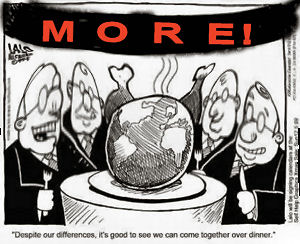




 Film: "Australia's Murray River Murray Darling Disaster"
Film: "Australia's Murray River Murray Darling Disaster" Lateline film on COAG, "New Deadline to Save Murray Darling" 7 August 2008)
Lateline film on COAG, "New Deadline to Save Murray Darling" 7 August 2008)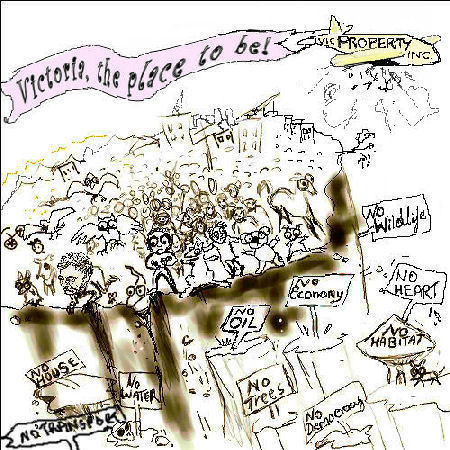
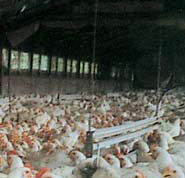

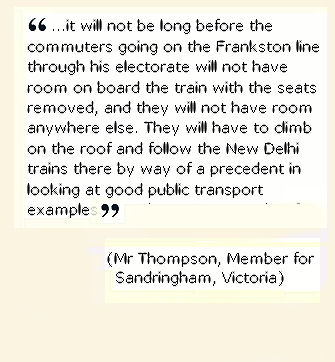


 We need look no further than New South Wales and the Wollongong scandal for confirmation that money can buy governments and decisions, particularly planning decisions. Yet NSW has an Independent Commission Against Corruption [ICAC], something we don't have in Victoria.
We need look no further than New South Wales and the Wollongong scandal for confirmation that money can buy governments and decisions, particularly planning decisions. Yet NSW has an Independent Commission Against Corruption [ICAC], something we don't have in Victoria.
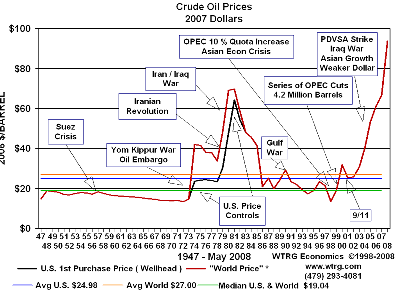
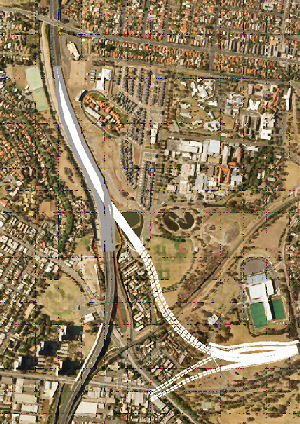
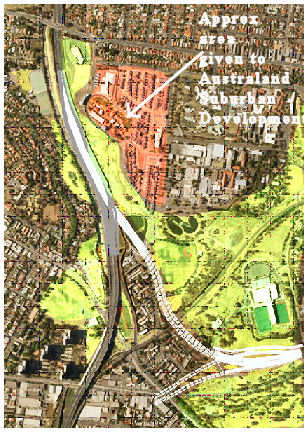

 For his political courage in speaking out against undemocratic, but mainstream media and government endorsed, growth, actor, Geoffrey Rush deserves particular historic recognition from Australians. He launched a new website: Marvellous Melbourne at https://marvellousmelbourne.org. Candobetter.net editor 12 January 2017: Unfortunately, eight years later it is no longer maintained, so we have removed the link. Candobetter.net remains one of its memorials. However the problem those optimistic protesters set out to solve has grown every year into a behemoth that threatens many of our institutions and certainly our way of life, all over Australia.
For his political courage in speaking out against undemocratic, but mainstream media and government endorsed, growth, actor, Geoffrey Rush deserves particular historic recognition from Australians. He launched a new website: Marvellous Melbourne at https://marvellousmelbourne.org. Candobetter.net editor 12 January 2017: Unfortunately, eight years later it is no longer maintained, so we have removed the link. Candobetter.net remains one of its memorials. However the problem those optimistic protesters set out to solve has grown every year into a behemoth that threatens many of our institutions and certainly our way of life, all over Australia. 
 Word is that Melbourne is getting its 1 million more ten years early and that the Vic Government is in a panic because it has no idea how many permanent new guests have taken up its foolhardy invitations to come and stay. Who the hell is responsible?
Word is that Melbourne is getting its 1 million more ten years early and that the Vic Government is in a panic because it has no idea how many permanent new guests have taken up its foolhardy invitations to come and stay. Who the hell is responsible?
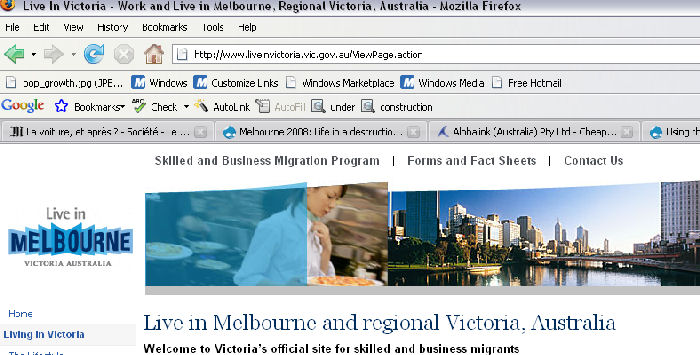


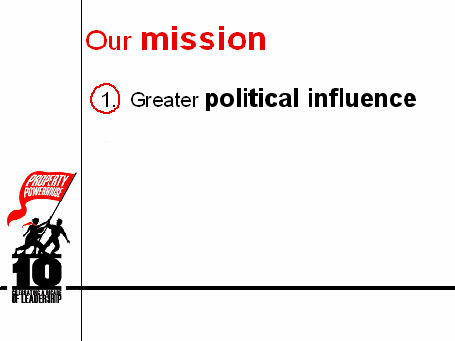
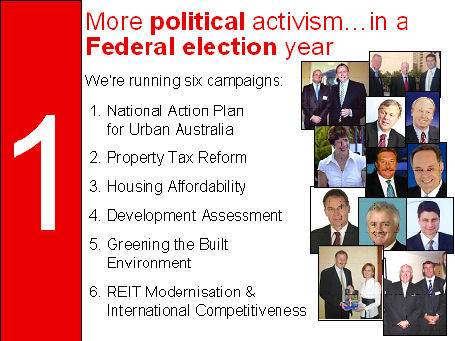

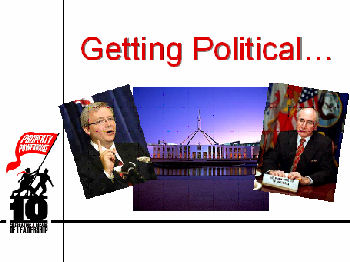

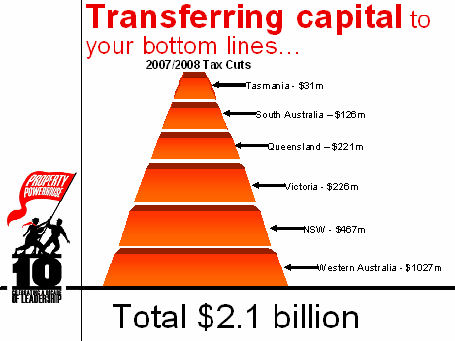
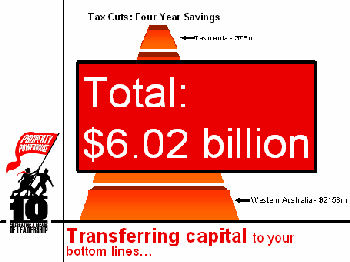

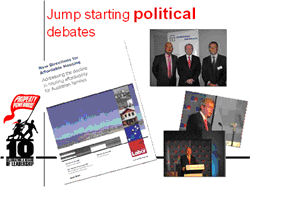


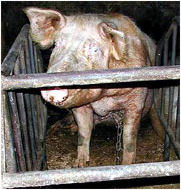 Anglo-capitalism is a system born of dispossession and one which has industrialised cruelty to humans and animals on a massive, constantly worsening scale. (See
Anglo-capitalism is a system born of dispossession and one which has industrialised cruelty to humans and animals on a massive, constantly worsening scale. (See 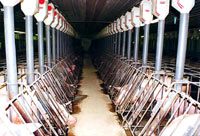



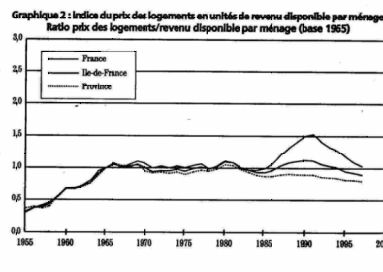
Recent comments